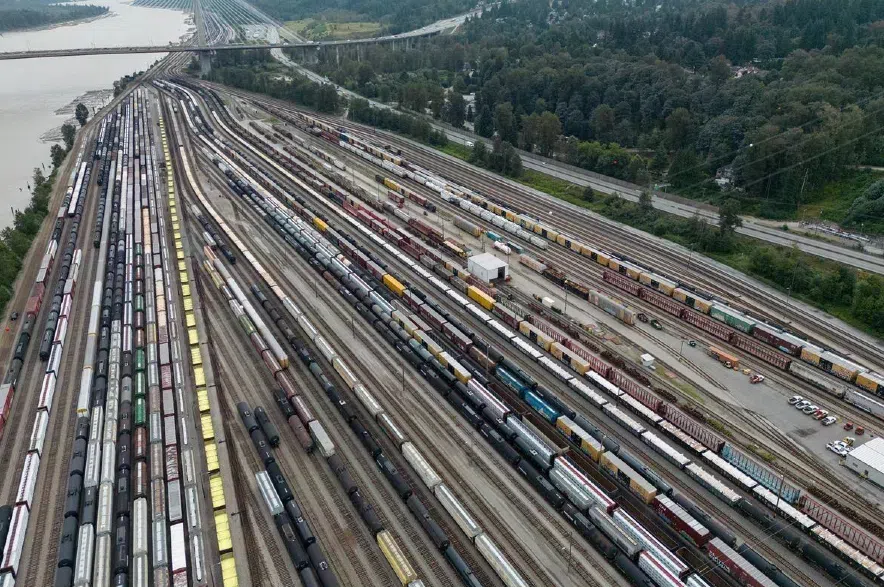Nevin Markwart, Chief Information Security Officer at FutureVault and former Saskatchewan Party candidate, as well as former professional hockey player who recently wrote an opinion piece in The Globe and Mail about separatism in Saskatchewan. He talked to Vassy Kapelos about his thoughts and solutions for the province.
The Vassy Kapelos Show airs on Saturdays and replays on Sundays on 650 CKOM and 980 CJME.
Read more:
- ‘Silence is complicity’: Sask. NDP continues call for Scott Moe to condemn separation work
- Sask. Government says NDP aiming to ‘silence’ residents with bill on referendum rules
- EXCLUSIVE: Premier Scott Moe on Western separatism
- Sask. NDP introduce bill to make separation vote tougher
These questions and answers have been edited for length and clarity.
Vassy Kapelos: The title of your op-ed is Scott Moe must repair Saskatchewan relationship with Ottawa. Why do you think that is necessary?
Nevin Markwart: I wrote the article as my way of putting a nail in these secession discussions and I used the premier’s recent clear statements calling for a strong Saskatchewan in a united Canada. That’s one of the founding principles of the Sask. Party.
I am a finance guy, a numbers person. I’m also a former NHL hockey player that understands how a team has to work. It was my attempt to say to the people of Saskatchewan and the people of Canada that we’re an exporter around the world and in order for Saskatchewan to be prosperous we have to be a part of the team.
Kapelos: How prevalent is the separatism sentiment, is it is an extreme position held by people in Saskatchewan or more mainstream?
Markwart: People can believe what they’d like to believe, however, if I look at the prosperity of Saskatchewan and our ability to meet the needs of the people of the province, specifically in areas like health care and education, we need to scale our economy.
Scale comes from being big and I’ve never seen a business get big by getting smaller. The idea of separatism is the idea of getting smaller and it makes absolutely no economic sense in my mind.
Kapelos: Where do you see the greatest potential for reset of the relationship between Saskatchewan and Ottawa to exist?
Markwart: In the last couple of weeks, the premier has changed his tone and he’s very focused on the idea of a strong Saskatchewan in a united Canada. Whatever activities through the legislature, our schools or through mentoring of our friends and neighbours that allows us to be more united will result in more prosperity in Saskatchewan and more prosperity in Canada.
Kapelos: What about the centrality of resources and getting resources to new markets. Do you believe that is central to whatever relationship exists going forward?
Markwart: lSaskatchewan has a bit over a million people. We are a very big province at 250,000 square miles. So for us to deliver on health care and education we have to be prosperous, which means we have to increase the economy in Saskatchewan.
The next steps for Saskatchewan are figuring out where the stuff is that’s bringing in capital from external sources but we also need the means to get those resources out of the province, basic transportation infrastructure.
We need to partner with other provinces and with the federal government to ensure that those resources are available for us to be able to get the natural gas and the oil and the potash and uranium and the wheat and the other agricultural products out to market.
Kapelos: Do you feel that the possibility of consensus around what you just described exists against the backdrop of threats from the United States to a greater degree than it did before?
Markwart: I think that the crisis situation that has been created around tariffs and what is going on in the United States has brought a collective understanding that Canadians have to come together.
We’re starting to see some of the issues with regards to interprovincial trade that probably are what I call legacy policies — things that were decided on 10, 20, 30, 40, years ago — so we need to look at some of those policies very critically and say, ‘wait a minute, this isn’t in our best interest.’
Whoever wrote these rules didn’t understand or wasn’t privy to the acceleration of Canada to where we have to come together.
The metaphor is that math of teamwork is that one plus zero is one, but one plus one is three. We have to start orienting ourselves owards the one and one equals three, and stay away from the one plus zero equals one.
Read more:











